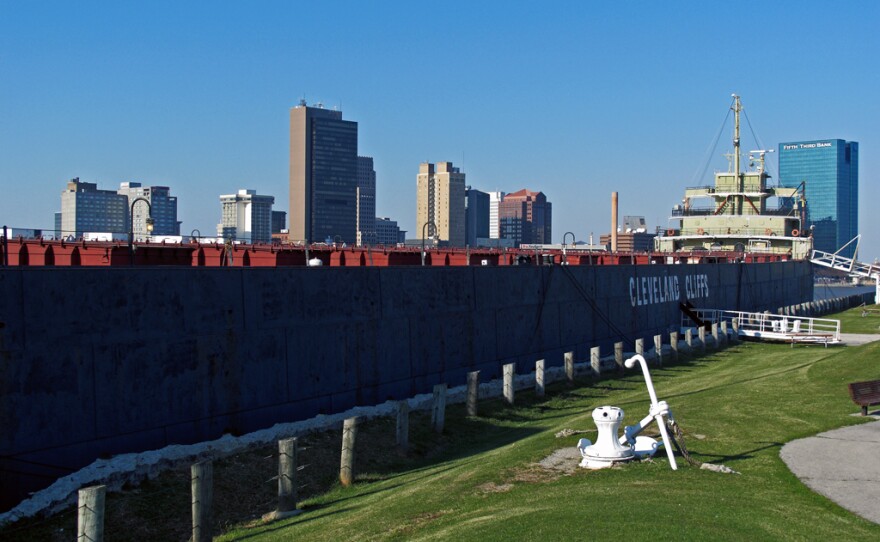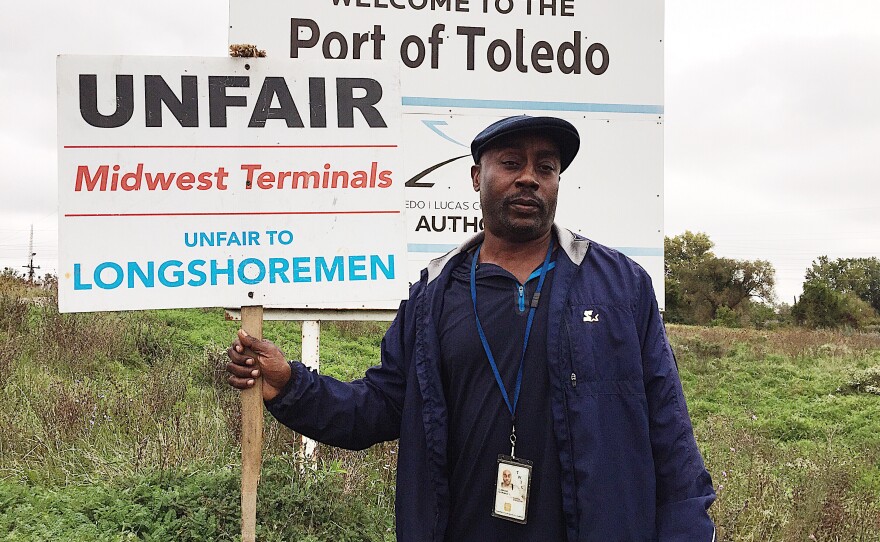For 13 years, Terrance Clemons loaded and unloaded cargo at Midwest Terminals, the stevedoring company that leases and operates the Toledo-Lucas County Port Authority’s international cargo dock.
He was fired from the company in the spring of 2017.
Clemons is one of many African-American longshoremen to lose work in a near decade-long labor dispute between his union — the historically black International Longshoreman’s Association (ILA), Local 1982 — and Midwest Terminals.
“It’s all about discrimination,” Clemons says.
For the last seven months, Clemons has run an informational picket against his former employer.
At dawn each day, he parks his green truck a half-mile from the docks and sets up signs that read: “Unfair, Midwest Terminals Unfair to Longshoremen.” The picket sits across the street from a sprawling construction site that will soon be home to the Cleveland Cliffs Hot Briquetted Iron Plant.
The half-mile of road between Clemons and the docks is an important stretch, with crucial pieces for the $700 million Cleveland Cliffs project expected to travel it this fall en route to their eventual home.
Toledo — with its active port and proximity to two major thoroughfares, Interstate 80 and Interstate 75 — sits at a unique transit crossroads. In the slow-to-grow city, the logistical hub of the port authority is a crucial economic driver. So it was a pretty big deal when Clemons’ and his union brothers stopped international shipping into and out of the port’s only international cargo dock for the entire summer. Anxiety around the potential economic impact of this logjam grew so great that leaders across the state called on the U.S. Coast Guard to intervene and open commerce back up. The Coast Guard complied.
The picket on the Maumee
Things started heating up in May. That's when members of ILA Local 1982 set up a picket line on the Maumee River to get the attention of lake pilots bringing cargo into Midwest Terminals.
Lake pilots, or U.S. registered pilots, occupy a highly codified position on the Great Lakes. According to federal law, a U.S. registered pilot is required to navigate any cargo ship traveling on the Great Lakes. The lakes and their tributaries are carved up into regions, each with its own pilotage association in charge of dispatching pilots to incoming, outgoing, or traversing cargo ships.
Sanjukta Paul, a professor of labor law at Wayne State University, describes the shipping market on the Great Lakes as “a highly coordinated sector, with the government very closely involved in regulating the actions of private actors, such as the pilots.”
Despite such close oversight, for more than 20 years, pilots did have some liberties when it came to labor disputes. This autonomy — the freedom to decide whether to cross a picket line — was why the longshoremen wanted pilots as their picket audience. They wanted them to know that there was a labor dispute at the docks, and hoped the pilots would keep the ships out of port in solidarity.
And they did.
The result: International shipping into and out of Midwest Terminals seized up overnight. It stayed that way through mid-September, the threat of delayed cargo too big a risk for shipping companies to take.
Pat Gallagher worked ships on the Great Lakes for nearly 40 years. He was a member of the Lake Pilots Association — the group responsible for pilotage on Lake Erie and portions of its tributaries — for 18 years. Like all pilots, he depended on longshoremen, who helped him dock ships in all types of conditions.
“Everything needs to work like a clock,” he says.
More than anything, Gallagher says, that working relationship was on the line when it came to honoring picket lines. To not honor a longshoreman’s picket would hurt that relationship.
“Here I’m the longshoremen, and you’re not honoring my line? And you want me to work with you and you don’t want to work with us? It puts a little strain on it,” he says.
Bill Yockey is also a former lake pilot. He’s been running the longshoremen's union, ILA Local 1982, as a trustee since 2016. He says there's no greater catalyst for a port to negotiate a contract than the financial ramifications of stalled ships and a bad reputation.
“Most of the time, if you’ve stopped a ship for three or four days, the white flag of surrender goes up,” he says. “Well, that didn’t happen here.”
Lobbying the Coast Guard
Facing an entrenched labor dispute with little hope for resolution, Toledo-Lucas County Port Authority CEO Paul Toth, Toledo Mayor Wade Kapszukiewicz, and a group of local and regional leaders sought other methods to open international shipping back up.
Their efforts coalesced around the potential delay of fall-scheduled shipments for the Cleveland Cliffs Plant. The company hopes the $700 million plant will play a crucial role in the Great Lakes steel supply chain as steel production transitions away from traditional blast furnace mills to electric arc furnaces. Electric arc furnaces, or “mini mills,” currently depend on unsteady supplies of partially processed iron from countries like Russia, Ukraine, and Brazil, says Michael Cowden, a steel correspondent for the trade publication, Fast Markets AMM.
The scope of the project made for an easy sell to business leaders and elected officials throughout the region and state.
“We couldn’t get into a situation where labor was leveraging the pilots to stop progress,” says Toth. “That was really the biggest concern of our community, making sure that we open this port back up, and not really affect the project.”
The barrier for Toth lay in an arcane Coast Guard directive known as the Admiral Henn Letter. The letter, issued in 1994, outlined the Coast Guard’s general policy concerning labor disputes, “not to take sides,” and a pilot’s rights when encountering a labor dispute — “a registered pilot may refuse to render pilotage services to a vessel during a labor dispute.”
To reverse this instruction, Toth met with local, state, and federal politicians over the summer to warn them about how he thought this rule was threatening economic development.
Soon the Coast Guard’s inbox began to fill up. First came a letter from U.S. Reps. Bob Gibbs, Bob Latta, and Jim Jordan, all Republican congressmen from Ohio. They urged the newly appointed Commandant of the Coast Guard, Admiral Karl Schultz, to “address the application of the regulations” and “ensure the safe and orderly flow of commerce on the Great Lakes.”
Then, Toledo area elected officials, industry leaders, and heads of large labor unions, called on the agency “to change its policy to require these pilots to be available to guide international vessels 24/7.”
Finally, days before the September 10 meeting of the Great Lakes Pilotage Advisory Committee, U.S. Sen. Rob Portman, R-Ohio, wrote a letter to Admiral Schultz urging for a solution that “[minimizes] disruptions to maritime commerce.”
Former lake pilot Bill Yockey attended that meeting and says that the fix was in. “It was well orchestrated,” he says. “It was like going to a New York production of how to f--k us.”
Two days later, the Coast Guard canceled the directive, essentially barring pilots from honoring picket lines. In his explanatory letter, Michael Emerson, director of Marine Transportation Systems, writes, “The Coast Guard will use its full range of existing authorities to ensure each vessel subject to the Pilotage Act receives a pilot upon request and safely sails on schedule.”
The decision rankles Yockey. “I would think that they would tell [Midwest Terminals owner] Alex Johnson, 'You settle your f--king problems with the ILA so we can get these ships loaded.' They didn’t. They changed the law. They changed the stadium. Changed the playing field. We’re still without a contract,” he says.
For Captain Dan Gallagher (no relation to Pat Gallagher), president of the Lake Pilots Association, the new instruction reads like an ultimatum.
“We have a charter that is issued by the United States Coast Guard,” Gallagher says, “and if we don't follow the directive of the United States Coast Guard, our pilots could be sanctioned and/or the association could be stripped of its charter.”
Labor law expert Sanjukta Paul of Wayne State University sees this as a clear threat to pilots’ First Amendment rights, not to mention another example in a long and sometimes violent history of the federal government intervening in labor disputes.
The labor dispute
ILA Local 1982 and Midwest Terminals have been unable to negotiate a contract for nearly six years. In that time, the number of union members working on the docks has dwindled from around 40 to four.
The union accuses the company of subverting all manner of union activities, including denying opportunities for training and work advancement to union members, and subverting the union’s call lists. Those call lists are organized by seniority, meaning the higher a union member is on the call list, the more frequently they will get called in to work. Various union members say they are now being passed over on the seniority list in favor of less experienced, non-union white workers.
“All I know is I’m not working, and I should be working everyday,” says Ray Sims.
Sims ran cranes and front-end loaders for a decade before Midwest Terminals took over the general cargo dock in 2004. His experience operating special machinery placed him on the skilled list, earning him a higher wage and more favorable job assignments. Now, he says, “there’s not a black person who runs a crane or an end loader down there. You do the math.”
In cases filed with the National Labor Relations Board, Midwest Terminals was found to discriminate against union members specifically when it came to training them on cranes.
That denial of opportunity, says Ralph Leiby, one of the four remaining longshoremen still working, is apparent at the docks. He recalls overhearing a non-union, Midwest employee say, “It would be a cold day in hell before a n----r runs those cranes.”
Leiby reported the incident to Miguel Rizo, the union steward responsible for monitoring daily conditions on the job. A similar quote appears in Rizo’s notes, dated August 7, 2017.
Rizo and Leiby both acknowledge that the kind of behavior that's the norm on the docks wouldn't fly in the rest of the world. Still, the discrimination and retaliation they've witnessed is “an ungodly thing,” says Rizo.
Both men, neither of whom are black, say they have faced retaliation in the form of increased scrutiny at work, demeaning work tasks (despite their seniority), and alienation from the rest of the workers on the docks because they still support the union.
Charles Williams, another union member who says he's been sidelined in favor of non-union, white workers, says the situation has gotten “unbearable.” He describes a segregated workspace where white workers park their cars inside the security gate, while black union members are forced to park outside, a quarter-mile away.
Midwest now controls security at the entrance gate. The effect, several union members say, is that prospective black workers are routinely turned away at the gate, only for white workers to be let in on the same job.
Williams says the company-controlled security is strategic. Normally, a local union will have office space at the dock to better settle disputes at the workplace. But the company won’t even let Bill Yockey, the current head of the union, in. “They know that if the outside comes in and sees it,” says Williams, “it'll really be publicized.”
Representatives from Midwest Terminals did not respond to these allegations. They denied Michigan Radio’s interview request, citing pending litigation.
Some of that litigation involves appeals to two decisions released by the National Labor Relations Board last fall. The cases reveal a suite of tactics used by Midwest Terminals to subvert the union. They include:
- Unilaterally changing “terms and conditions of employment,” including not providing equal training opportunities to union members and non-union members;
- Discharging or otherwise discriminating against employees for supporting the union;
- Denying pay to employees who are active in the union; and
- Threatening employees with a delay in processing their worker’s compensation claims if they engage in activities on behalf of the union.
The language within the NLRB cases only classifies discrimination as being against union members, without citing race as a motivation for the discrimination.
Local leaders who defend Midwest Terminals have clung to this idea, including Midwest’s landlord, the Toledo-Lucas County Port Authority.
“We have language in our lease that prohibits our operator from discrimination,” says Paul Toth, president and CEO of the Toledo-Lucas County Port Authority, “but the word discrimination can be used in many different forms.”
Critics of the union also cite a finding earlier this year by the Ohio Civil Rights Commission against ILA Local 1982. The commission ruled that there was probable cause that the union discriminated against two white members in “denial of work assignments” based on race.
Toledo's mayor, Wade Kapszukiewicz, also denies the union’s claims of wholesale racial discrimination. “In the passionate heat of the battle, there’s going to be a lot of things said, it doesn’t mean that they’re true,” he says. “I think you have a tiny splinter group of longshoremen who got out of step even with their own union.”
But for the black union members who are out of work, what is not apparent to the law or the leaders is apparent to the eye.
Ray Sims says his request is simple: “I want our union to have a contract, and I don’t want to be discriminated against. Period.”






